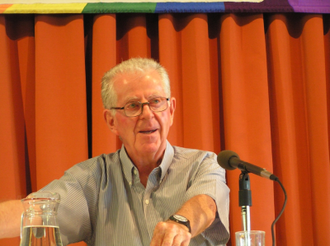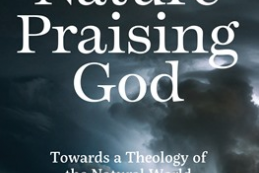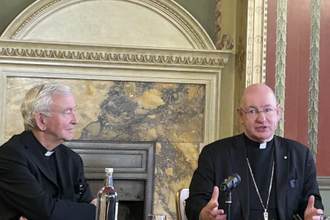Reflection on COP16: Caring for our Common Home

Fr Peter Hughes speaking at 2017 NJPN Conference in England
Fr Peter Hughes is an Irish Columban priest who has worked in Peru for nearly 60 years. He is co-ordinator of indigenous and human rights for REPAM, a Catholic Church network that promotes the rights and dignity of people living in the Amazon. Here he reflects on Church involvement in ecological issues, related to the 12-day United Nations Biodiversity Conference on Biodiversity (COP16) which is taking place in Colombia .
The last 10/12 years have certainly been a time of Kairos in the Church of Latin America and the Caribbean. I would like to highlight the role and the path traced by two main actors, Pope Francis and REPAM. The two are contemporaries, born separately, but immediately walking together since 2013. Francis was elected in that year while REPAM was born at the same time before its foundation 10 years ago in September 2014.
There has been an extraordinary harmony and mutual enrichment from the beginning between the two that is bearing fruit and new paths for the Church at the service of the world and history.
It is no coincidence that the great interlocutor for both Francis and REPAM is the crisis and the threat to the life of the Amazon territory, this includes the largest tropical forest on the planet and its own inhabitants, the native peoples. When Francis arrived in Brazil in July 2013, four months after his election, at World Youth Day in Rio de Janeiro, he declared to the bishops of Brazil and of Latin America (CELAM) that the defense of the life of the Amazon must be a priority for the Church in Latin America. "It will be the test for the Church in Latin America - what it must and can contribute to this need," he said. He used the colloquial and affectionate expression to reinforce his desire, saying, "we have to do something new, we have to be courageous".
Later, Francis declared that the Amazon territory, where exuberant life abounds because of the wonders and special beauty of the territory, was "invaded land" when he inaugurated the Synod of the Amazon in Puerto Maldonado in January 2018. Its life was threatened by the destructive forces of the way extractive industries operate. The territory today has, unfortunately, become a region where violence, depredation and destruction of the rainforest are rampant.
Francis presented his encyclical Laudato Sí on the eve of the Paris COP (Conference of Parties) on the climate crisis in 2015. This encyclical is the great reference not only for the Church but for the entire human family. It places Francis himself in an undisputed role of world leadership on the subject of making peace with nature.
REPAM proposes a new presence and a new way of assuming the mission of the Church in the Amazonian territory. It is based on building a network, weaving the evangelising task with the demands of the territory, dialoguing in the defense of threatened life. From its inception, it embodies both the mandate of Aparecida - released by the Latin American bishops in 2007 - to implement a joint pastoral in the Amazon, and then with the extraordinary invocation of Laudato Sí. REPAM is welcomed and embraced by the missionaries of the territory who assume that it puts into practice the new methodology of evangelisation, building and weaving networks with the motto: 'The Amazon, source of life and heart of the Church'.
Emergence of Integral Ecology
The Synod of the Amazon started with the invocation of Francis to listen to the voice of the territory and its inhabitants. The preparation stage consisted of 55 territorial meetings plus thematic meetings in the Vicariates. The methodology used was the consultation to listen to the voice of the territory inspired by the voice of the Spirit. Thus was born the discovery and the impact of what will later be called 'Listening'. Listening to the people of God, trying to share the way with them, in an open and horizontal dialogue, is the call to listen to the voice of the same Spirit. In the process, more than 80,000 voices were registered. The experience is a practice of the new paradigm of evangelisation, making synodal journey and building integral ecology.
It is the response we make to the voice of the Spirit, listening simultaneously to the cries of the pain of Earth and the cry of the poor. The invaded land is a victim of overexploitation and mistreatment in the logic of extractivism, with its harmful results that aggravate the ecological crisis. The cry of the poor is central in the journey of the Church from Medellin to Aparecida. The physiognomy of the Church in Latin America is constituted in recognising in the faces of our suffering brothers and sisters, the suffering face of Jesus. The poor, the forgotten, the insignificant are always the first recipients of the Kingdom proclaimed by Jesus. Listening to the voice of the Spirit opens us to what God asks of us today, which is expressed in the cries of Earth and the cry of the poor together and integrated.
With integral ecology, a new paradigm of justice emerges: "Integral ecology is not just another path that the Church can choose for the future in this territory, it is the only possible path, because there is no other viable way to save the region. The depredation of the territory is accompanied by the shedding of innocent blood and the criminalisation of the defenders of the Amazon". (Final Document of the Synod of the Amazon #67)
Loss of Biodiversity and Species
The exact total number of species and living organisms according to science varies widely. Estimates are usually between 10 and 30 million and can also reach up to 100 million. The rate of loss and extinction of species because of us is estimated to be between 1000 and 10,000 times what it could be without us.
Approximately 1.75 million species of living organisms have been scientifically described, most of which 80% are insects and most of the rest are green plants. In our time we can fully appreciate for the first time how we are losing the diversity and care of the species themselves. This rapid and radical extinction in the history of life is a crisis and we all share responsibility for it. The mind, the heart and the word of God are present in the species that weave the rich biodiversity.
This new look at nature is opening up in recent times. And on a deeper level, at a time when the colour of wonder is beginning to bleed out of the same rainbow of natural diversity that is witness to the continuous and constant creation of the creator's work. The integration of the wondrous gaze and the scientific discoveries of the different elements of natural life over a geological time of incalculable date are coming together. What is happening today is new and different. Most of the natural wealth and more than half of the described species are concentrated in tropical forests and warming oceans.
The final document of the Synod of the Amazon clearly expresses the current drama experienced by the territory: "All participants have expressed a keen awareness of the dramatic situation of destruction affecting the Amazon. This means the disappearance of the territory and its inhabitants, especially the indigenous peoples. The Amazon rainforest is a "biological heart" of the increasingly threatened land. The Amazon is in an unbridled race to the death. It requires radical changes with utmost urgency, new direction that will allow it to be to saved. It is scientifically proven that the disappearance of the Amazon biome would have a catastrophic impact for the whole planet!" (Amazon Synod 2, contribution by Han Schellnhuber, Potsdam Institute for Climate Impact Research and Antonio Nobre, PUC, Rio de Janeiro)
Pope Francis declares that the lungs of the planet are the Amazon and Congo basins. 'The ecosystems of the tropical forests have a biodiversity with an enormous complexity...but these forests are burned or razed to develop crops, and in a few years countless species are lost.' (Laudato Si #38)
Theological notes on Creation
The 2007 Aparecida document points out that God's marvelous creation is a reflection of God's beauty, wisdom and providence. Theology attempts to articulate the understanding of living creation as a marvelous work.
We find in the Bible the Canticle of Daniel and many psalms that celebrate this marvelous work, a reflection of the creator. In the Middle Ages, Albert the Great wrote 'Natural History', the first data on nature gathered from empirical experience. Although it is rooted in the fact that all creatures are there to serve humanity, there is in this book a sense of wonder at creation, its diversity and its usefulness.
His pupil Thomas Aquinas writes with meridian clarity: "God cannot express himself fully in a single creature: that is why he has created so many diverse forms of life, in such a way that what one fails to express the Divine Goodness can be compensated by others: because Goodness, which in God is unique and indistinguishable, in creatures is refracted in incalculable colours of existence". (Summa Theologiae, 1ª, q.47,a.1. "bonitas quae en Deo est simpliciter et uniformiter in creaturas est multiplicter et divisam".)
This text is a jewel that presents the enormous diversity and incredible complexity of the species of all living organisms as a great symphony of the unique Goodness that exists only in God. In the text Thomas Aquinas plays the same mystical music of Francis of Assisi who exclaims the praise of the natural world as our kin and brother, greeting Brother Sun and Sister Moon, Brother Wolf and this is not a mere metaphor.
Centuries later, Teilhard de Chardin will write that only love is capable of uniting living organisms in such a way as to complete them and bring them to a high degree because only love carries them and unites them in what is deepest in themselves (The Phenomenon of Man, Harper & Row, 1965). Teilhard saw in this phase of evolution a special task for Christians, for the Christian concept of love. He discovers the loving creative hand of the Creator God in the materiality of the rocks in all their geological evolution. Albert Einstein declares that the eternal mystery of the world is to be incomprehensible (1936).
LINKS
Fr Peter Hughes on Columban youtube: www.youtube.com/watch?v=_F06NzczDPs&t=29s
The Death of Life by Sean McDonagh SSC: www.indcatholicnews.com/news/573


















